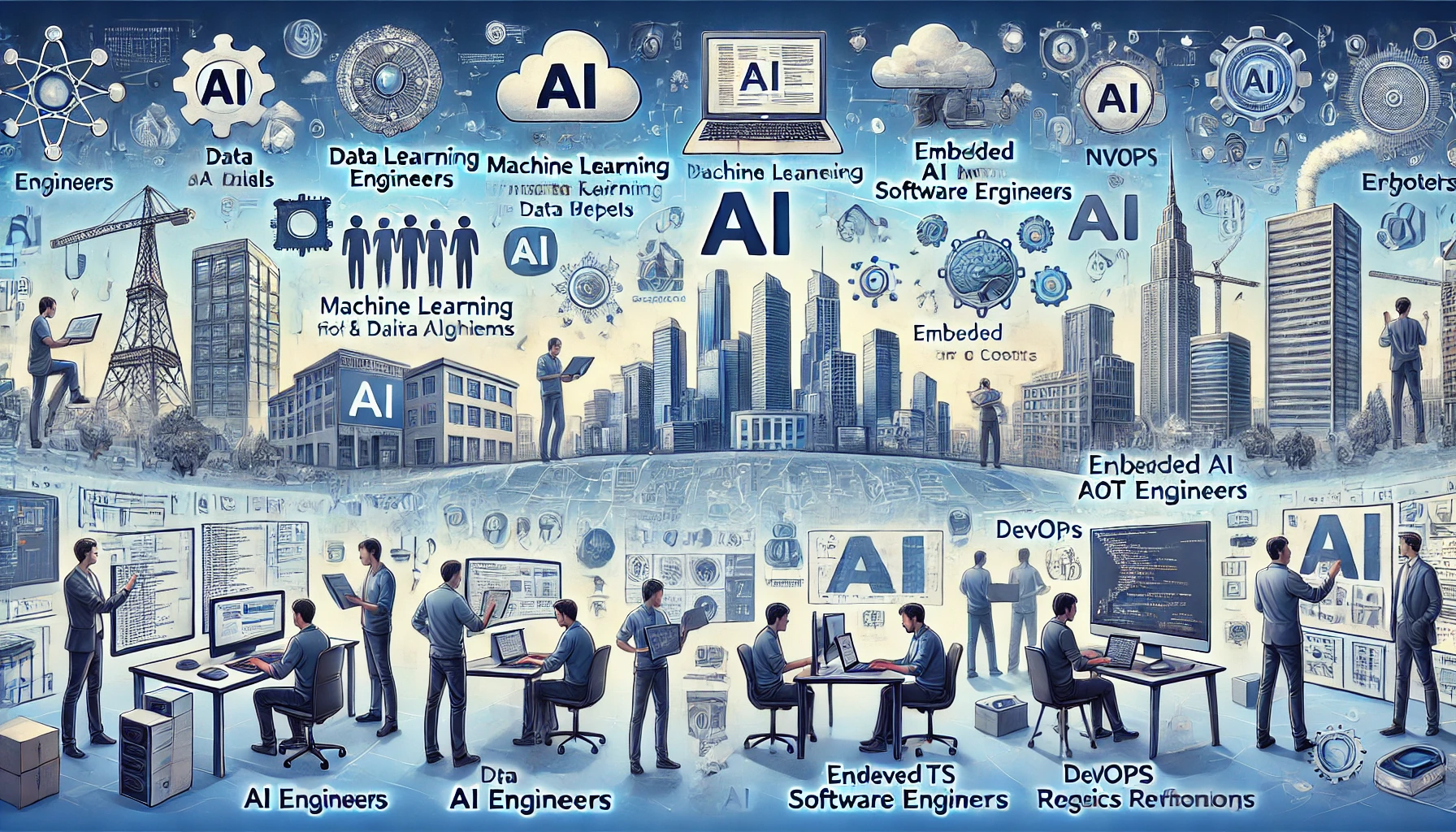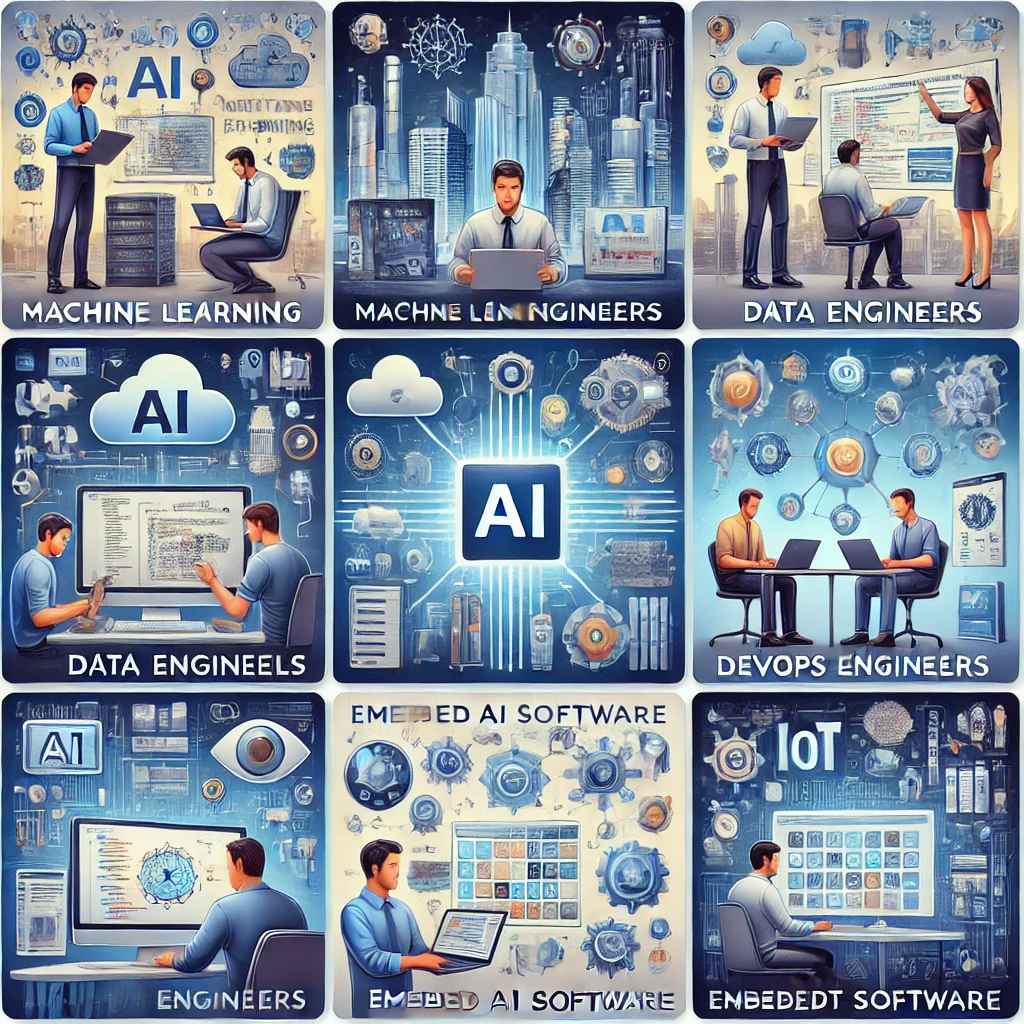
As technology continues to advance rapidly, artificial intelligence (AI) and machine learning (ML) are transforming industries across the globe. These technologies are reshaping the software engineering landscape from automating tasks to making data-driven decisions. In this blog, we’ll explore the different types of software engineering crucial in the AI and ML era and how they contribute to building intelligent systems.
1. Machine Learning Engineer
Machine Learning Engineers are at the forefront of the AI revolution. Their role involves designing algorithms that allow systems to learn from data and improve over time without explicit programming. This field blends traditional software engineering with data science to create intelligent models that can make predictions or decisions.
Key Responsibilities:
- Designing and training ML models.
- Processing and analyzing large datasets.
- Optimizing algorithms for performance.
- Collaborating with data scientists and AI researchers.
Use Cases:
Fraud detection, recommendation systems (e.g., Netflix, Amazon), self-driving cars, and healthcare diagnostics.
2. Data Engineer
Data Engineers play a pivotal role in AI and ML by ensuring that the data feeding into these systems is clean, organized, and available at scale. They build and maintain the infrastructure needed to collect, store, and process massive amounts of data.
Key Responsibilities:
- Creating data pipelines for real-time or batch data processing.
- Designing database architectures that can handle large datasets.
- Ensuring data security and privacy.
- Collaborating with data scientists to provide the necessary datasets for model training.
Use Cases:
Building data lakes, ensuring the flow of real-time data for analytics, and supporting AI-driven applications.
3. AI Engineer
AI Engineers focus on integrating AI models into existing software systems or developing entirely new AI-powered applications. Their role requires a deep understanding of AI principles, frameworks, and tools to build software that can mimic human intelligence.
Key Responsibilities:
- Developing AI models using frameworks like TensorFlow, PyTorch, or Keras.
- Implementing natural language processing (NLP) and computer vision algorithms.
- Deploying AI systems in cloud environments.
- Ensuring the AI model’s performance and accuracy over time.
Use Cases:
Chatbots, virtual assistants (e.g., Siri, Alexa), and computer vision systems for facial recognition.
4. DevOs Engineer (AI/ML Focus)
As AI and ML applications become more complex, ensuring their efficient deployment and maintenance is critical. AI-focused DevOps Engineers build and maintain the infrastructure that allows machine learning models to be deployed, scaled, and updated seamlessly. They bridge the gap between development and operations, ensuring that AI applications run smoothly in production environments.
Key Responsibilities:
- Automating the deployment of machine learning models.
- Managing cloud infrastructure for AI workloads.
- Monitoring model performance and updating models as needed.
- Ensuring system reliability, scalability, and security.
Use Cases:
Automating deployment for ML pipelines, managing AI workloads on cloud platforms, and monitoring model performance in real-time.
5. Software Engineers for Embedded AI Systems
As AI becomes more integrated into everyday devices, Embedded Software Engineers are playing a crucial role in implementing AI algorithms on hardware with limited computational power. These engineers focus on optimizing AI models for use in small, resource-constrained environments like IoT devices, smartwatches, and autonomous vehicles.
Key Responsibilities:
- Optimizing AI algorithms for low-power, low-latency environments.
- Working closely with hardware engineers to integrate AI capabilities.
- Developing custom solutions for AI on edge devices.
- Ensuring real-time processing for AI tasks.
Use Cases:
AI-driven IoT devices, edge computing, and autonomous systems such as drones or robots.
6. Natural Language Processing (NLP) Engineer
NLP Engineers specialize in enabling machines to understand, interpret, and generate human language. This type of software engineering is crucial for building AI systems that can process natural language, such as chatbots, virtual assistants, and language translation services.
Key Responsibilities:
- Developing algorithms for text analysis, speech recognition, and sentiment analysis.
- Working with large language models like GPT or BERT.
- Enhancing the machine’s ability to understand context, grammar, and intent in human language.
- Collaborating with data scientists and linguists to improve model accuracy.
Use Cases:
Customer support chatbots, AI writing assistants, and voice-activated systems.
7. Robotics Software Engineer
Robotics Software Engineers are crucial for developing intelligent machines that can interact with the physical world. As AI plays an increasing role in robotics, these engineers work on integrating AI algorithms with mechanical systems to build autonomous robots.
Key Responsibilities:
- Developing control algorithms for robots.
- Implementing AI-based decision-making processes for autonomous behavior.
- Ensuring safety and precision in real-world operations.
- Collaborating with hardware engineers to build AI-driven robotics systems.
Use Cases:
Autonomous drones, warehouse robots, and AI-powered industrial machines.
Conclusion
The AI and machine learning era has introduced new types of software engineering roles that are focused on harnessing the power of intelligent systems. Whether you’re building data pipelines, deploying AI models at scale, or optimizing AI algorithms for embedded devices, the impact of these disciplines is shaping the future of technology. As AI continues to evolve, so will the need for specialized software engineers capable of driving innovation in this exciting and transformative field.
By embracing these diverse roles, software engineers can position themselves at the cutting edge of AI and ML, contributing to groundbreaking developments that will redefine industries for years to come.
Explore our website to learn about our services, access resources, and check out our blog for the latest insights and tips. If you have any questions, feel free to reach out. Enjoy your visit to invortech.com!
Tags: #AI Engineering #Machine Learning #Software Engineering #Data Engineering #Robotics Development


